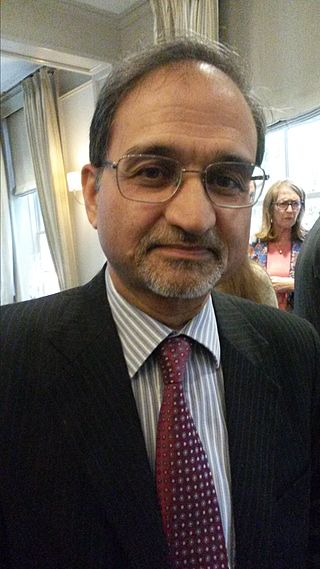Personal life
He is married to Professor Anisha Shah, a Senior Professor of Clinical Psychology at the NIMHANS for more than two decades.
Shekhar P. Seshadri is an Indian psychiatrist. He is a professor of the Department of Child and Adolescent Psychiatry in NIMHANS, Bangalore, India. [ citation needed ]He is widely quoted by the media and has for decades been associated with numerous mental health initiatives. [1] He is the older brother of the actress, Meenakshi Seshadri. He has co-authored two books and has also written chapters as a guest author. He is known for his research work in life skills training, child sexual abuse, masculinities, women's mental health issues and sexual minorities. [2]
He is married to Professor Anisha Shah, a Senior Professor of Clinical Psychology at the NIMHANS for more than two decades.
Shekhar Seshadri completed his MBBS from Maulana Azad Medical College from 1975 to 1980. He then did his DPM and then M.D. in Psychiatry from NIMHANS in 1983 and 1985 respectively. He then held various academic positions at the NIMHANS, Bangaluru from 1986 to 2021 when he retired as a Senior Professor. Upon retirement, he is associated with SAMVAAD as a Senior Advisor. SAMVAAD is a National Initiative and Integrated Resources for Child Protection, Mental Health, & Psychosocial Care established by NIMHANS with the support of the Ministry of Women and Child Development, Government of India.
Shekhar Seshadri was awarded the Keshav Desiraju Memorial Award for Outstanding Public Service in Mental Health, 2024, for his exceptional contributions to child and adolescent mental health in India. [3]
In 2012, Dr. Seshadri was awarded the Dr. Achar Oration Award at the Annual Conference of Indian Psychiatric Society.

Mohan Agashe is an Indian psychiatrist and actor. He was awarded the Sangeet Natak Akademi Award in 1996 in theatre.

The National Institute of Mental Health and Neuro-Sciences is a medical institution in Bengaluru, India. NIMHANS is the apex centre for mental health and neuroscience education in the country. It is an Institute of National Importance operating autonomously under the Ministry of Health and Family Welfare. NIMHANS is ranked 4th best medical institute in India, in the current National Institutional Ranking Framework.

Damini (transl. Lightning) is a 1993 Indian Hindi-language crime drama film directed and co-written by Rajkumar Santoshi. It stars Meenakshi Seshadri in the title role with Rishi Kapoor, Sunny Deol and Amrish Puri. Aamir Khan makes a special appearance. The story revolves around Damini who witnesses her housemaid being raped by her brother-in-law and his friends. Despite facing many obstacles, she strives to get justice for herself with the help of her husband and Govind, a lawyer. The film is considered one of the best woman-centric films ever made in Bollywood. Above all Meenakshi Seshadri's towering performance fully justifies the central character of "Damini"
James Frederick Leckman is an American child psychiatrist and psychoanalyst and the Neison Harris Professor of Child Psychiatry, Psychiatry, Psychology and Pediatrics at the Yale School of Medicine, recognized for his research in Tourette syndrome (TS) and obsessive–compulsive disorder (OCD).

Hosur Narayan Murthy was an Indian clinical psychologist, writer, philosopher, Sanskrit scholar and teacher who headed the department of clinical psychology at National Institute of Mental Health and Neuro Sciences (NIMHANS) at Bangalore. He was born in the city of Bangalore in 1924 to Brahmin parents Hosur Ramaswamaiah Subba Rao and smt Rajamma. Murthy's father was an official at "Iron and Steel Plant" at Bhadravathi town in Karnataka.

Mary Jane Rotheram-Borus is a licensed clinical psychologist and professor with the University of California, Los Angeles, Department of Psychiatry and Biobehavioral Sciences. Rotheram is the professor-in-residence in the Semel Institute for Neuroscience and Human Behavior. She is the Director of the Global Center for Children and Families at UCLA and the former director of the Center for HIV Identification, Prevention, and Treatment Services.
Ravivarma Marthanda Varma was an Indian neurosurgeon, one of the pioneers of Indian neurosurgery and the founder director of the National Institute of Mental Health and Neurosciences (NIMHANS). He was the originator of a new surgical procedure for treating Parkinson's disease which later came to be known as Varma's Technique. He was a former Deputy Director General of Health Services, Government of India and an honorary surgeon to R. Venkataraman, former president of India. He was honoured by the Government of India in 1972 with Padma Shri, the fourth highest Indian civilian award.

Vikram Harshad Patel FMedSci is an Indian psychiatrist and researcher best known for his work on child development and mental disability in low-resource settings. He is the Co-Founder and former Director of the Centre for Global Mental Health at the London School of Hygiene and Tropical Medicine (LSHTM), Co-Director of the Centre for Control of Chronic Conditions at the Public Health Foundation of India, and the Co-Founder of Sangath, an Indian NGO dedicated to research in the areas of child development, adolescent health and mental health. Since 2024, he has been the Paul Farmer Professor and Chair of the Department of Global Health and Social Medicine at Harvard Medical School in Boston, where he was previously the Pershing Square Professor of Global Health and Social Medicine. He was awarded a Wellcome Trust Principal Research Fellowship in 2015. In April 2015, he was listed as one of the world's 100 most influential people by TIME magazine.
Ernesto Caffo is the founder and President of SOS Il Telefono Azzurro Onlus and Fondazione Child. He is a Chair Professor of Child and Adolescent Psychiatry at the University of Modena and Reggio Emilia, full-time Director of the Department of Paediatrics for the Hospital of University of Modena, and director of the 6th edition of the Master Assessment and Intervention in situations of child abuse and pedophilia at the University of Modena and Reggio Emilia.
Turaga Desiraju was an Indian neurophysiologist and a professor at National Institute of Mental Health and Neurosciences (NIMHANS). He was associated with AIIMS Delhi before joining NIMHANS and founded the Department of Neurophysiology at NIMHANS in 1975. He was known for his neurophysiological studies on sleep and wakefulness and his extensive studies on the activities of cerebral cortex helped to widen the understanding of conscious behaviour.

Shekhar Saxena has worked at the World Health Organization (WHO) and since 2010 has been the Director of the Department of Mental Health and Substance Abuse (MSD) at World Health Organization's Headquarters Office in Geneva, Switzerland. He is recipient of the 2017 Leon Eisenberg Award. In September 2018 joined the Harvard T.H. Chan School of Public Health as visiting professor of Global Mental Health in the Department of Global Health and Population.

Kathleen Ries Merikangas is the Chief of the Genetic Epidemiology Research Branch in the Intramural Research Program at the National Institute of Mental Health (NIMH) and an adjunct professor of epidemiology at the Johns Hopkins Bloomberg School of Public Health. She has published more than 300 papers, and is best known for her work in adolescent mental disorders.

Stanley Paul Kutcher is a Canadian Senator and Professor Emeritus of Psychiatry at Dalhousie University. He was appointed to the Senate of Canada on 12 December 2018.

Ganesan Venkatasubramanian is an Indian psychiatrist and clinician-scientist who works as a professor of psychiatry at the National Institute of Mental Health and Neurosciences, Bangalore (NIMHANS). His overarching research interest to learn the science that will facilitate a personalized approach to understand and treat severe mental disorders like schizophrenia. Venkatasubramanian is known for his studies in the fields of schizophrenia, transcranial Direct Current Stimulation (tDCS), brain imaging, neuroimmunology, neurometabolism and several other areas of biological psychiatry. The Council of Scientific and Industrial Research, the apex agency of the Government of India for scientific research, awarded him the Shanti Swarup Bhatnagar Prize for Science and Technology, one of the highest Indian science awards, for his contributions to medical sciences in 2018. He was also one of the collaborating scientists in the NIMHANS-IOB Bioinformatics and Proteomics laboratory of the Institute of Bioinformatics (IOB) in Bangalore and NIMHANS. Besides, he is an adjunct faculty at the Centre for Brain Research (CBR) in Bangalore.

Jörg Michael Fegert is a German child and adolescent psychiatrist, psychotherapist and university professor.

Tamsin Jane Ford is a British psychiatrist specialising in children's mental health. Since 2019 she has been based at the University of Cambridge where she is now Professor of Child and Adolescent Psychiatry, Head of the Department of Psychiatry and Fellow of Hughes Hall. She has been heavily involved with the Incredible Years Teacher Classroom Management (TCM) programme, created by Carolyn Webster-Stratton, which aims to raise and improve children's mental health in primary schools across Devon. Her work also ties in with the Strengths and Difficulties Questionnaire (SDQ), created by UK psychiatrist, Robert Goodman.

Mental healthcare in India is a right secured to every person in the country by law. Indian mental health legislation, as per a 2017 study, meets 68% (119/175) of the World Health Organization (WHO) standards laid down in the WHO Checklist of Mental Health Legislation. However, human resources and expertise in the field of mental health in India is significantly low when compared to the population of the country. The allocation of the national healthcare budget to mental health is also low, standing at 0.16%. India's mental health policy was released in 2014.

Keshav Desiraju was an Indian bureaucrat who served as the union health secretary of the country. He was known for his contributions to mental health and community healthcare and was the architect of the country's Mental Healthcare Act of 2017.

Dharwad Institute of Mental Health and Neurosciences (DIMHANS) is a public medical institution in Dharwad, Karnataka, India, which provides healthcare facilities specializing in Mental Health, Psychiatry and Neuroscience. Additionally, DIMHANS offers several Post-Graduate academic programs.
Susarla Krishna Shankar was a neuropathologist and neuroscientist who served as a Director of National Institute of Mental Health and Neuro Sciences (NIMHANS), Bengaluru, India. He also served as a Professor and Head of the Department of Neuropathology of NIMHANS from 1998 to 2012. He served in NIMHANS for more than three decades. He founded the first and only Brain Bank in India at NIMHANS to encourage neuroscience research in the nation. He, a former Research Associate in the AIIMS, New Delhi, was regarded as a pioneer in the field of biobanking. He was honored with the Pioneer in Biobanking Award by the Biobank of India Federation and is regarded as the 'Father of brain banking in India'. He also served as the President of the Neuropathology Society of India. He founded the Neuropathology Brain Museum, which is first of its kind in India, housed in NIMHANS. In addition, he was a consultant for the Bioinformatics and Proteomics Laboratory of the Institute of Bioinformatics (IOB) housed in NIMHANS. He was involved in the collaborative project of 'Human Proteome Map' of Institute of Bioinformatics (IOB), NIMHANS and Johns Hopkins University. He had been an elected fellow of various prestigious academic bodies like the College of Pathologists, the National Academy of Medical Sciences and the National Academy of Sciences.
{{cite web}}: Missing or empty |title= (help)